|
| CHP Center for Health
Promotion
|
| Project
PAN (Physical Activity and Nutrition) |
The Physical Activity and Nutrition (Project PAN)
works to promote healthier lifestyles among people in
their prime or advanced years, seeking to increase physical
activity and improve nutrition in innovative ways. |
|
| TAKE10!® |
 |
| |
Activity
up-to-date |
| |
|
| |
Luncheon seminar was co-hosted at the 26th Japanese Society of Health Education and Promotion |
| |
|
| |
In the 26th Japanese Society of Health Education and Promotion Academic Conference held at Waseda University (Shinjuku-ku, Tokyo), a luncheon seminar "Elderly Health and Health Promotion" was held in collaboration with ILSI and Ajinomoto Co., Ltd.
First, Mr. Hisamine Kobayashi of Ajinomoto Co., Ltd. gave a lecture titled 'Protein, and amino acid intake' useful for prevention of Sarcopenia', in which he discussed the prevention of Sarcopenia and Locomotive Syndrome which affects the health of the elderly. Efficient muscle protein synthesis can be improved by ingesting essential amino acids high in leucine content (Amino L 40).
Next, a lecture titled "Practice of Health Promotion in Region" was given by Ms. Kimura of ILSI Japan. She introduced activities in the region focusing on health promotion. The seminar was successful with standing room only audiences and active discussions. (June 24, 2017)
|
| |
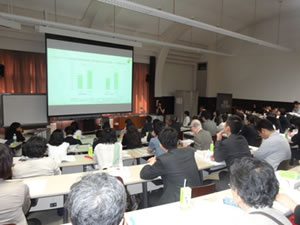 |
| |
|
|
|
| |
"Ishinomaki Take10! ®" A new team started at Ishinomaki Sensyu University. |
| |
|
| |
After the Great East Japan Earthquake, while participating in Professor Yamazaki’s seminar in the Management Department of Ishinomaki Senshu University, ILSI began conducting 'Ishinomaki Take10!' classes, in which mainly students participated. It is its 3rd generation now, and the sense and style of the students are changing little by little. So we have decided to shift from activities focused exercise to food and nutrition.
Meanwhile, we received a request from a student volunteer team of reconstruction assistance in faculty of human studies established after the earthquake that they would like to work on Take101. So, in July 2017, we presented a lecture to them on Take10! Their activities started in November 2017 at meeting places in the temporary housing complexes. |
| |
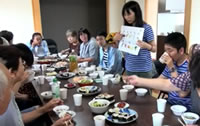 |
|
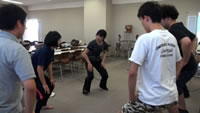 |
| |
|
| |
Poster presentation at the 76th Annual Meeting of the Japanese Society of Public Health (Kagoshima) |
| |
|
| |
We presented a poster presentation on the appropriateness of food intake frequency score in a long-term care prevention project - comparison with dietary variety score of food intake.
Dietary Variety Score of food intake (DVS) counts the amount of 10 food-groups consumed daily (a range from 0 to 10), and is used as an outcome measure of the Nursing Care Prevention Project, especially for nutrition improvement by local governments. However, we think that focusing on daily intake does not always reflect changes in the subject's eating habits. Therefore, we developed a new index the "Food Intake Frequency Score" (FFS) that is on a scale from 0 to 30 with changes in frequency. In this analysis, we confirmed that there is a high positive correlation between the Dietary Variety Score and f Food Intake Frequency Score (criterion-related validity). In addition, because the Food Intake Frequency Score can give more detailed information on dietary habits, it may be more useful in the Nursing Care Prevention Project. (November 1, 2017)
|
| |
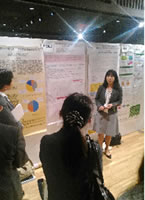 |
|
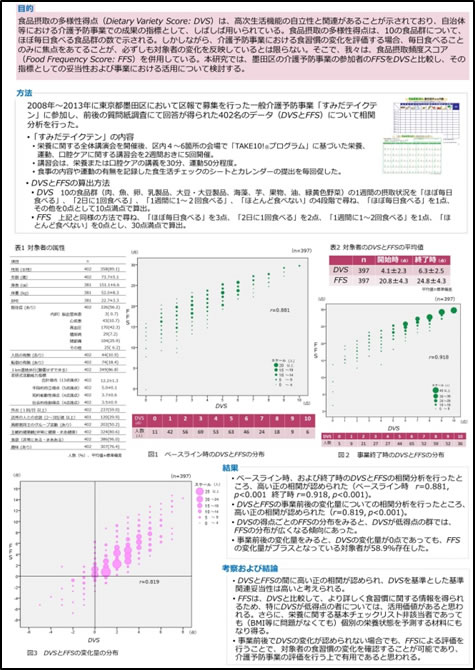 |
| |
|
|
|
| |
The 13th year of "Sumida Take10!" was successfully implemented. |
| |
|
| |
This year, we used 3 venues, including a new venue the Sumida Ward General Gymnasium, and held 8 courses (4 months). Since this project covers only the first participants, we also support the establishment of voluntary circles for those who have completed the course to continue Take10!. Six circles whose group names were made up of the name of the place or the origin of formation such as "YY Take10!", "Nadeshiko Take10!", "Tachibana Take10!", "Nanatsuboshi Take10!", "Sunflower Take10!", and "Sky Take10!" have been formed so far. (November 29, 2017)
|
| |
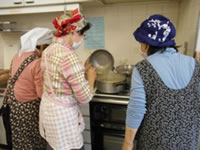 |
|
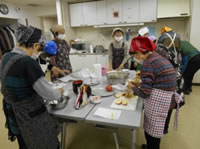 |
| |
|
| |
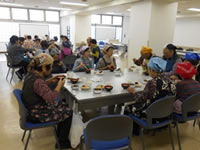 |
|
|
| |
|
| |
|
| |

|
|
| |
Achievements
to date |
| |
The first intervention study
was conducted with 1,418 elderly in Nangai village, Akita
Prefecture from July 2002 for one year. This study showed
that TAKE10!® for the
elderly can effectively be introduced to local communities
and can improve regular physical exercise practices and
dieting habits, maintain muscle strength and improve physiological
functions. The result of the study was reported at the
Annual Meeting of Japanese Society of Public Health in
2004. Three national newspapers and eight local newspapers
covered the study. More than 9,000 inquiries have been
received, including inquiries from local government offices
and organizations, and more than 25,000 copies of the
booklets have been sold. DVD and cooking booklets (both
in Japanese only) also can be available from the TAKE10!®
website, http://take10.jp/chapter5.html#item01.
The "Sumida TAKE10!®" program was started by Sumida
Ward Government of Tokyo in October 2005, and more than
1,100 elderly people have taken part in the program over
eleven years. The program was conducted at four to six
sites and included lecture sessions on the program and
physical exercise practices. This is also designed as
an intervention study and the results have consistently
been reported at the annual meeting of Japanese Society
of Public Health. Particularly, the results of the 2005
Sumida TAKE10!® intervention
study was published in the international journal "BMC
Geriatrics". http://www.biomedcentral.com/1471-2318/13/8.
Having receiving mandates from local governments all over
Japan, social welfare councils, Silver Human Resources
Centers, and some volunteer groups, we have trained TAKE10!®
peer leaders and supporters. TAKE10!®
programs are continuously being implemented in many regions
around Japan. |
| |
|
|
Intervention
studies using the TAKE10!® handbook |
| |
Community-based
intervention study 【Akita】 (2002-2003)
Partner: Tokyo Metropolitan Institute of Gerontology
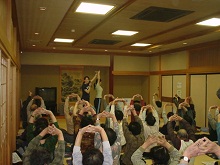
An intervention study was conducted using 1,400
elderly recidents of Nangai village, Akita Prefecture
for one year starting in July 2002. The study proved that
TAKE10!® for the elderly can effectively be introduced
to local communities and can improve regular physical
exercise practices and dietary habits, maintain muscle
strength and improve physiological functions. The result
of the study was reported at the Annual meeting of the
Japanese Society of Public Health in November 2004. Three
national newspapers and eight local newspapers covered
the study. More than 10,000 inquiries have been received,
including inquiries from local government offices and
organizations, and more than 25,000 copies of the handbooks
have been sold. Many lecture sessions by ILSI Japan CHP
have been conducted. Lectures have also been given in
Tokyo, Kanagawa, Aomori, Yamagata, Nagano, Gifu, Aichi,
and Fukuoka.
The
summary is available in English (1).
Sumida
TAKE10!® 【Tokyo】 (2005-2006, the first year)
Partner: The Sumida Ward Office
A cross over study was conducted with 170 elderly
people to evaluate the effect of the Sumida TAKE10!®
program. The program began with a seminar "Nutrition
for the Elderly" and then the participants learned
proper dietary habits and exercise using the TAKE10!®
handbook in a series of training sessions (5) organized
every two weeks. As a result, dietary variety scores increased
significantly and physical exercise habits improved (2).
Furthermore, we found that physical exercise habits were
sustained even at six months and one year following completion
of the program (3).
TAKE10!® for correspondence
model 【Hokkaido】 (2008)
Partner: Sapporo Medical University
In December 2008, ILSI Japan CHP and Sapporo Medical University,
Hokkaido undertook a joint study to verify the effectiveness
of the correspondence version of the "TAKE10!®
Program". As it is quite difficult for the elderly
in rural areas or areas with heavy snow-fall to meet together
and participate in health promotion programs, the development
of alternative methods is necessary. About 130 elderly
participants over 70-years-old from 3 districts (Toyako-cho,
Makkari-village and Hidaka-cho) participated in this study.
Results of this study related to physical exercise showed
significant improvements in "normal walking speed"
and in the "timed up & go test" among participants
who frequently engage in physical exercise (4).
Results related to dietary habits found significant improvements
in the frequencies of intake of foods from the 10 main
food groups in the Japanese diet (5).
 |
|
Long-Term elder care prevention
project commissioned by local governments |
| |
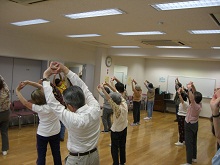 |
| |
Sumida TAKE10!® 【Tokyo】
(2005-2006, the eighth year)
Partner: The Sumida Ward Office
Since October 2005, a program to reduce nursing care
called, Sumida TAKE10!®, has been implemented for
elderly in general and elderly certified by the secondary
prevention program in Sumida-ku, Tokyo. Every year,
ILSI Japan CHP holds a seminar called "Nutrition
for the Elderly" and 30 training sessions (five
training sessions at six sites) using the TAKE10!®
handbook. Under this program, ILSI Japan CHP staff provide
direct guidance to the participants at each site. The
training sessions consist of explanations on how to
use the TAKE10!® check sheet (frequencies of main
10 food groups in Japanese diet), and instruction on
exercise habits and oral care. Furthermore, since 2007,
we have also organized follow-up classes for elderly
who have completed the basic classes. Each year, TAKE10!®
classes gather more than 100 elderly for the main classes
and more than 200 elderly for the follow-up classes,
with a total of more than 900 elderly participating
in the classes. We evaluated the effectiveness of this
program using a questionnaire survey as well as before
and after physical fitness measurements. The results
show improvements in dietary habits, exercise habits
and physical strength. We also observed a secondary
effects, such as improved social interaction.

|
|
Training of TAKE10!® peer-leaders
In order to respond to more requests from local
governments, ILSI Japan is developing another TAKE10!®
model utilizing local government personnel and voluntary
groups consisting of local residents. |
| |
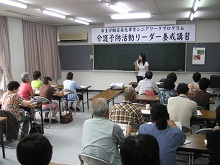 |
| |
Tsuwano TAKE10!® 【Shimane】 (2007〜 on-going)
Partner: Tsuwano Town Silver Human Resource Center
In connection with a Ministry of Health, Labor and
Welfare promoted care service volunteer system, Tsuwano
Town asked ILSI Japan CHP to conduct a TAKE10!® peer-leaders
training program for "nursing care prevention"
for members of the Tsuwano Town Silver Human Resource
Center. As a result of this training, twenty three members
qualified to be "TAKE10!® peer-leaders"
who will start local health care classes using the "TAKE10!®"
handbook. Tsuwano TAKE10!® is expected to be one of
the models used for promoting the TAKE10!® program.
Masuda TAKE10!® 【Shimane】
(2008〜 on-going)
Partner: Mashuda City Silver Human Resource Center
Since 2008, ILSI Japan CHP has accepted a commission from
the City of Masuda to provide a "TAKE10!® peer-leaders
training program" for "Masuda Silver Human Resource
Center" members. Consequently, fifteen new "TAKE10!®
peer-leaders" were born. Recently, "TAKE10!®
peer-leaders" has held more than eighty nursing care
prevention classes in local communities at the request
of local community organizations. We expect that utilizing
local, active elderly people as human resources for nursing
care prevention can be an effective model for improving
health in an aging society.
Nishiki TAKE10!® 【Yamaguchi】 (2010〜 on-going)
Partner: Iwakuni City Council of Social Welfare
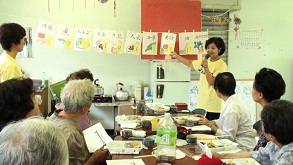
ILSI CHP Japan undertook a "TAKE10!® peer-leaders
training program" sponsored by the Iwakuni City Council
of Social Welfare and is conducting it in Nishiki-cho,
Iwakuni City, Yamaguchi Prefecture. Twenty-three people
who will be in charge of local initiatives for nursing
care prevention have qualified as "TAKE10!® peer-leaders".
As this group of people includes social workers and welfare
workers who are most familiar with and responsible for
elderly people living alone in local communities, great
results can be expected from future community-based services
and activities initiated by them.
Edogawa TAKE10!® 【Tokyo】 (2011〜
on-going)
Partner: The Non Profit Organization "kokuminnkennkoukaigi"
ILSI Japan was commissioned by kokuminnkennkoukaigi
to organize a "TAKE10!® peer-leaders training
program" for elderly people who completed the lectures
on nursing care prevention in Edogawa-Sougou-Jinsei-Daigaku.
Consequently, nine qualified as "TAKE10!® peer-leaders".
Development of a TAKE10!® peer-leaders instruction
package
ILSI Japan CHP developed a manual package for leaders
of local authorities and TAKE10!® peer-leaders in
order to smoothly organize TAKE10!® classes using
the TAKE10!® handbook. The package contains a leaders
manual, a DVD for exercise, reference materials, food
package samples, posters and a TAKE10!® handbook.
 |
|
Promotion
of TAKE10!® in collaboration with universities and
institutions |
| |
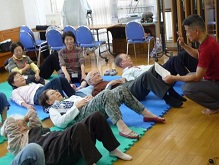 |
| |
Senboku Newtown Project
【Osaka】 (2011〜 on-going)
Partner: Graduate School of Human Life Science, Osaka
City University
With the aim of regenerating the community so that people
can live healthier and more comfortable lives, a "Senboku
Hottokenai Network" was organized to utilize
community human and material resources. For example, the
plan includes meal delivery services by elderly people,
restaurants operated by people with disabilities, operation
of shared facilities that utilize vacant stores, operation
of reformed prefecture housing with elderly support. ILSI
Japan CHP considers TAKE10!® to be a useful tool for
the "Diet and Health Support Program", and organized
TAKE10!® classes. In support of this program, Prof.
Aoki, Graduate School of Human Life Science, Osaka City
University is investigating the effect of a nursing care
prevention program which includes meals prepared at shared
facilities and TAKE10!® exercise.
"TAKE10!® for the Elderly" in Vietnam 【Vietnam】
(2011〜 on-going)
Partner: National Institute of Nutrition, Vietnam
Vietnam Public Health Association (VPHA)
Although Vietnam has only just entered an era of societal
aging, it is predicted that Vietnamese society will age
even more rapidly than Japanese society. Therefore, they
are considering measures to take early action, which include
drawing on Japanese experiences. ILSI Japan CHP assists
the VPHA in developing a Vietnamese version of TAKE10!®.
 |
|
Promotion
of TAKE10!® program through publications and seminars |
| |
Publications |
| |
As part of the TAKE10!® Program, we prepared
our cookbook by focusing on the following points:
1) large font printing, 2) inclusion of many photographs
to visually display recipes, and 3) efforts to encourage
people to try cooking new dishes. (We appreciate the
research grant from J-Milk and the technical support
of the professors and the cooking laboratory of the
Tokyo Dietitian Academy.)
|
| |
›
"TAKE 10!® DVD Basics and
Advanced (Only in Japanese) |
| |
This DVD offers a basic understanding of TAKE10!®
by explaining the dietary habits recommended in
the TAKE10!® Program. It also offers new physical
activities for use as entertainment for those who
have been practicing TAKE10!® for several years
already. This DVD is suitable not only to be watched
in the home, but also by groups such as gatherings
of neighborhood elderly groups, public welfare service
organized exercise classes at community centers,
or health care programs in nursing homes. ("TAKE10!®
DVD Advanced" was sponsored in part by Coca-Cola
(Japan) Co., Ltd., 2009)
|
| |
|
| |
Seminars (2011)
|
| |
February
|
Sumida ward, Tokyo |
| |
June
|
Setagaya ward, Tokyo |
| |
October
|
Setagaya ward, Tokyo |
| |
November
|
Edogawa-Sougou-Jinsei-Daigaku, Tokyo |
| |
November
|
Sumida ward, Tokyo |
| |
|
| |
Conference
presentations (2011)
|
| |
October
|
The Japanese Society of Public
Health Annual Meeting, Akita |
| |
|
| |
Seminars (2010)
|
| |
March
|
Sumida ward, Tokyo |
| |
June
|
Edogawa-Sougou-Jinsei-Daigaku, Tokyo |
| |
September
|
The Japanese Society of Nutrition and Dietetics
Symposium, Tokyo |
| |
November
|
Shinagawa ward, Tokyo |
| |
November
|
Edogawa-Sougou-Jinsei-Daigaku, Tokyo |
| |
|
| |
Conference
presentations (2010)
|
| |
October
|
The Japanese Society of Public Health Annual
Meeting, Tokyo |
| |
|
| |
Newspapers,
magazines, TV (2010)
|
| |
April
|
NHK TV program, "Tameshite Gatten" |
| |
June
|
The Daily Yomiuri |
| |
July
|
The Nikkei Weekly |
| |
August
|
NHK TV program Morning News |
| |
September
|
Magazine NHK "Tameshite Gatten" |
| |
October
|
Magazine Momo |
| |
November
|
Magazine Healthcare restaurant |
| |
|
| |
 |
|
| |
Publications |
|
|
|
|
1
|
|
Shu
Kumagai, Community-directed Intervention Trial to
Prevent Disabilities with Advancing Aging for the
Functionally Competent Community-living Senior Citizens
- Effects of TAKE10!® Program Comprised Exercise
and Nutrition on the Muscle Strength and Nutritional
Status, ILSI No.81, 2005. |
|
|
|
|
2
|
|
Kimura
et. al., Poster presentation, Japanese Society
of Public Health Annual Meeting, Toyama, October
2006. |
|
|
|
|
3
|
|
Kimura
et. al, Poster presentation, Japanese Society
of Public Health Annual Meeting, Fukuoka, October
2008. |
|
|
|
|
4
|
|
Furuna
et. al, The influence of frequency of intervention
via mail on physical and social function - Examination
in community-dwelling older adults living in rural
are of northern Japan, Journal of Society for Applied
Gerontology - Japan, Vol 5 (1), 2011. |
|
|
|
|
5
|
|
Kimura
et. al, Poster presentation, Japanese Society
of Public Health Annual Meeting, Tokyo, October
2010. |
|
| |
|
| |
Donors
and supporting organizations
(Alphabetic order) |
| |
The programs of ILSI CHP Japan
have been supported by donations from the public and private
sector. ILSI CHP Japan very much appreciates the generous
contributions. |
| |
Ajinomoto Co., Inc.
Kao Corporation
Suntory Holdings Limited
J-milk (Japan Dairy Association)
Nichirei Corporation
Coca-Cola (Japan) Co., Ltd.
Nestle Japan Ltd.
Meiji Co., Ltd.
|
| |
Scientific
advisors |
| |
Prof. Shuichi Kimura, Professor Emeritus, Tohoku
University
Prof. Shu Kumagai, Faculty of Health Sciences,
University of Human Arts and Sciences
Dr. Takao Suzuki, Director, Research Institute,
National Center for Geriatrics and Gerontology
Prof. Taketo Furuna, Department of Physical Therapy,
School of Health Sciences, Sapporo Medical University
|
| |

|
|
|
|
(July 2018)
|
|
|
|
|
|
Copyright © 2004-2024 International
Life Sciences Institute Japan , All Rights Reserved
|

